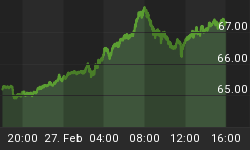Gold Forecaster - Global Watch
Below is a snippet from the latest weekly issue from www.GoldForecaster.com | www.SilverForecaster.com
At the heart of the global monetary system lies the use of the U.S.$ as the currency used to pay for the globe's oil. Any change in that role has a disproportionate impact on the importance of the $ as well as its value relative to the globe's other currencies. If the oil producing nations of the world decided to use other currencies for oil payments then the global monetary system itself is undermined, making gold more attractive and long-term a safer place to hold one's savings.
So when we heard that Iran asked the Japanese refiners to switch to the Yen to pay for all crude oil purchases, after Iran's central bank said it is reducing its holdings of the U.S.$, we realized that this is an undermining blow to the $ and will also contribute to the current fall of the $ in exchange rate values, despite any short-term rally.
Iran wants Yen-based transactions "for any/all of your forthcoming Iranian crude oil liftings," according to a letter sent to Japanese refiners that was signed by Ali A. Arshi, general manager of crude oil marketing and exports in Tehran at the National Iranian Oil Co. The request is for all shipments "effective immediately," according to the letter, dated July 10.
Japan's annual oil imports from Iran costs 1.24 trillion yen ($10.1 billion) against the entire world's demand for oil of around $2.354 trillion a year. This is not a huge amount of Yen let alone U.S.', but it is significant in that it is a breakaway from the $ and it is possible to break away.
Now add this to the new policy of the Central bankers of Venezuela, Indonesia, and the United Arab Emirates, which have said they will invest less of their reserves in $ assets because of its weakening prospects. At what point will they permit the switch to other currencies in payment of oil?
Iran isn't alone in wanting to drop the $ as the oil currency. Russia has been favoring the Ruble payment for the Urals oil export blend in rubles to curb currency risks. The nation plans to open the Energy Stock Exchange in St. Petersburg in the first half of next year to trade oil in rubles, U.B.S. AG reported June 14. Russia's ambitions as the major supplier of Europe will have considerably more impact on the $ as well as bring the Ruble into the mainstream of global currencies.
Iran asked the refiners to use the Yen exchange rate quoted at the Bank of Tokyo Mitsubishi on the date oil cargoes are loaded. The use of yen-based letters of credit for oil "has finally been approved" by the Iranian central bank and the NIOC, according to the letter, titled "New payment mechanism for Iranian Crude Oil Cargoes."
Japan imported 1.59 million kiloliters of Iranian crude oil in May, the least since June 2006, according to government data. Only Saudi Arabia and the United Arab Emirates are larger oil suppliers to Japan than Iran.
In addition, but not of nearly so much significance, is the policy of Iran in cutting its U.S.$ reserves to less than 20% of total foreign currency holdings. Consequently it will buy more Euros and Yen as tensions with the U.S. increase, Central Bank Governor Ebrahim Sheibany said on March 27 2007. It is important to realize that the content of reserves is not nearly as significant as the daily use of the $ in paying for oil, unless it is in the hands of a nation like China with its [so far] $1.3 trillion, sitting statically in U.S. Treasuries and other $ denominated assets.
If one, for example cut the use of the $ in global transactions in oil by half $1.177 trillion, where will these dollars go? They will be surplus to global requirements. As we all know this amount of unutilized $s is sufficient to swamp the foreign exchanges looking for a place to go. Their eventual path will be to absorb it back into Treasuries, a burden that will hit both the Treasury yields as well as the $ exchange rate, heavily. This is why the paths we have described that lie ahead will be so pernicious to the U.S.$. We have ignored the effect on all other $ users, which if brought in more than justify short, medium and long-term investments in gold.
We have just been informed that China is now quoting in the € on export contracts. Has the change begun to spread significantly? If this is common practice in China the $ will come under heavy long-term pressure. We will continue to keep you informed of such $-impacting events.
![]()
Please subscribe to: www.GoldForecaster.com for the entire report.















